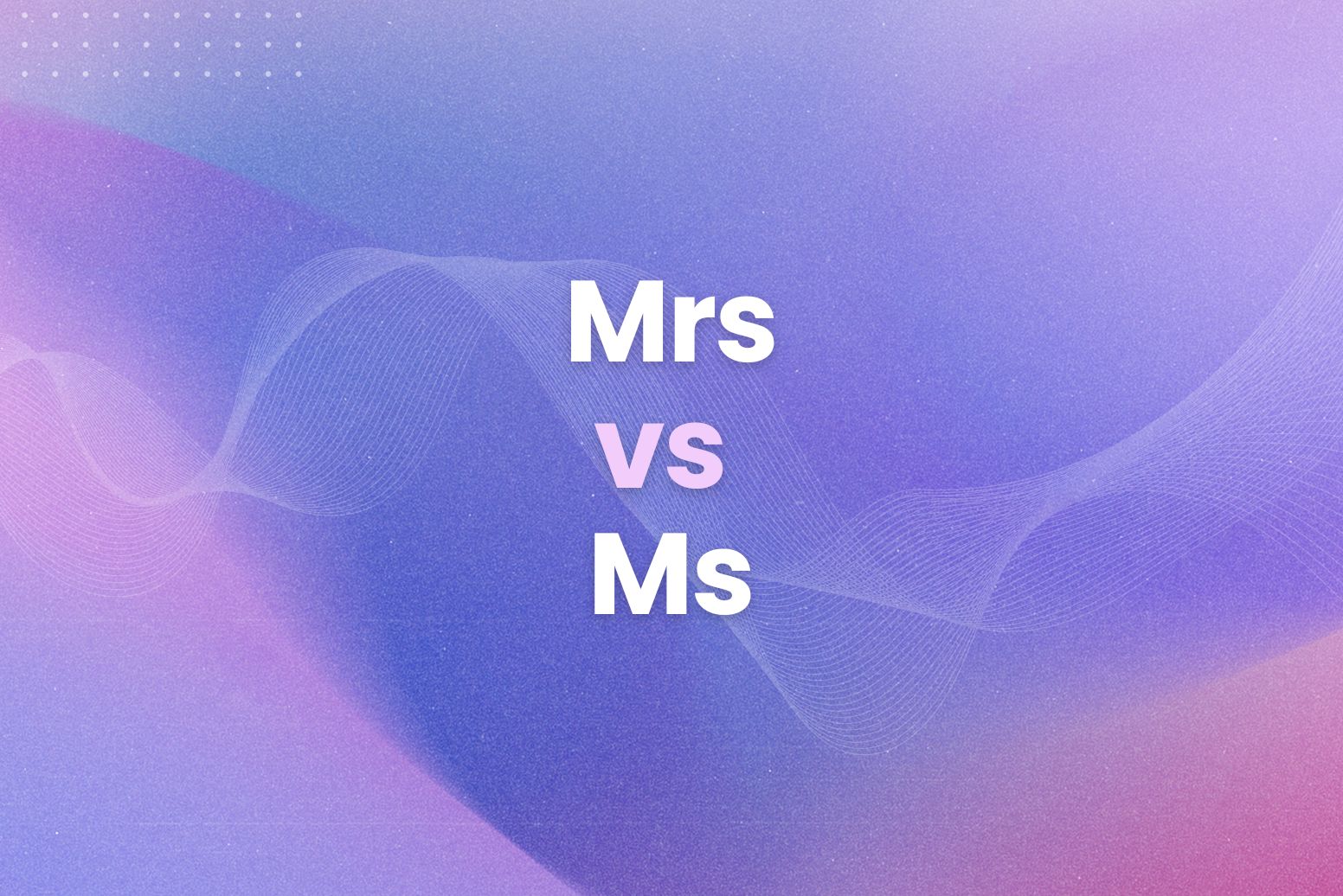Misusing Mrs. or Ms. can create an awkward first impression, especially in professional settings. It’s a small detail that speaks volumes. For instance, imagine addressing a respected colleague as Mrs. when she prefers Ms. It can undermine your credibility. Therefore, getting it right matters. So, we’re here to help you clear up any confusion between Mrs vs Ms. In short, this guide provides the answers you need.
- When to use Mrs.
- When to use Ms.
- Why these titles matter in modern communication
- How to handle tricky situations
- Tips for respectful communication, in addition to title usage
When to Use Mrs.
Mrs. is traditionally used for married women. That is to say, it indicates a woman is married. For example, if Jane Smith marries John Doe, she might become Mrs. Doe (or Mrs. Jane Doe).
However, using Mrs. is less common than it used to be. In other words, many women prefer Ms. regardless of marital status. Consequently, it’s best to use Mrs. only when you are certain a woman prefers it.
For instance, if a woman specifically introduces herself as “Mrs. Smith,” or you see it in official correspondence from her, then it’s appropriate to use Mrs. In addition, some older women may still prefer this title.
- Pro Tip: If you’re unsure, it’s always safer to use Ms. first. Then, if she corrects you or indicates a preference for Mrs., you can adjust accordingly.
When to Use Ms.
Ms. is the most versatile title for women. In short, use it when you’re unsure of a woman’s marital status. For instance, in professional settings, Ms. is generally the safest choice.
Moreover, Ms. is appropriate for all women, regardless of whether they are married, single, divorced, or widowed. Similarly, it’s the standard title used in business correspondence when you don’t know a woman’s preference.
For example, if you’re writing a letter to a woman whose marital status is unknown, Ms. is the proper form of address. In addition, many women simply prefer Ms. as a matter of personal choice, even if they are married.
- Pro Tip: Ms. is always a respectful default. Above all, it avoids making assumptions about a woman’s personal life.
Why These Titles Matter in Modern Communication
Titles like Mrs. and Ms. might seem like small details. However, they play a significant role in modern communication. That is to say, they show respect and professionalism. For example, using the wrong title can create a negative first impression.
Furthermore, in today’s diverse society, respecting individual preferences is paramount. In other words, using Ms. as a default shows you value inclusivity. Therefore, it avoids making assumptions about a woman’s personal life.
For instance, in a business setting, using Ms. projects professionalism and avoids potential awkwardness. In addition, using the correct title shows you pay attention to detail.
- Pro Tip: Using the correct title builds rapport and strengthens relationships. Above all, it demonstrates good communication skills.
How to Handle Tricky Situations (Mrs vs Ms)
Sometimes, you might find yourself in a tricky situation regarding titles. For example, what if you’re unsure of someone’s preference and can’t ask directly? In short, defaulting to Ms. is always a safe bet.
However, there are other situations to consider. For instance, what if someone uses Mrs. on their business card, but you know they are divorced? In this case, it’s best to follow what they have presented. Similarly, if someone consistently uses Mrs. in their email signature, you should respect that choice.
Moreover, if you accidentally use the wrong title, apologize briefly and politely. For example, “I’m so sorry, Ms. Smith. I mistakenly used the wrong title.” After that, use the correct title going forward.
- Pro Tip: A brief, sincere apology is always the best approach. Above all, avoid making a big deal out of the mistake.
Tips for Respectful Communication, in Addition to Title Usage
Using the correct title is just one aspect of respectful communication. That is to say, there are other important factors to consider. For example, clear and concise language is key. In other words, avoid jargon or overly complex sentences.
Furthermore, active listening is essential. Similarly, paying attention to nonverbal cues shows respect. For instance, maintaining eye contact and nodding to acknowledge what someone is saying demonstrates engagement.
Moreover, being mindful of cultural differences is crucial. Consequently, what is considered polite in one culture might be different in another. In addition, using a tool like Arvin can help with clear and concise writing. Arvin’s grammar check ensures your message is professional and easy to understand. It catches errors that could distract from your message.
- Pro Tip: Respectful communication is about more than just words. Above all, it’s about showing genuine consideration for others.
Ready to Polish Your Communication with Arvin?
Choosing the right title is a simple yet powerful way to show respect. Therefore, by understanding the nuances of Mrs. and Ms., we can build stronger connections and avoid awkward situations. In short, respectful communication starts with these small but significant details.
Key takeaways on Mrs vs Ms
- Ms. is the safest default if you’re unsure of a woman’s marital status.
- Respect individual preferences; ask if you’re unsure.
- Using the correct title demonstrates professionalism and consideration.
- Clear and concise language is also important for respectful communication.
Just as choosing the correct title shows attention to detail, so does ensuring your writing is error-free. Arvin’s grammar check helps you polish your communication, catching those small mistakes that can undermine your message. Using Arvin is a great way to ensure your written communication is as respectful and professional as possible, just like using the right title.
FAQs About Mrs vs Ms
Is it proper to use Mrs vs Ms?
Both are proper, but Ms. is generally the safest choice. That is to say, it avoids assumptions about marital status. Consequently, it’s suitable for all adult women.
Is Ms. the same as Mrs.?
No. In short, Mrs. specifically refers to a married woman. However, Ms. is a general title for all women, regardless of marital status.
Is it Mr. or Ms. for girls?
Neither. For young, unmarried girls, Miss is the appropriate title. For instance, you would use Miss for a girl in elementary school.
What is the difference between Mrs. and Smt.?
Smt. is an abbreviation used primarily in India, similar to Mrs. It refers to a married woman. Similarly, Mrs. is the common English equivalent.








